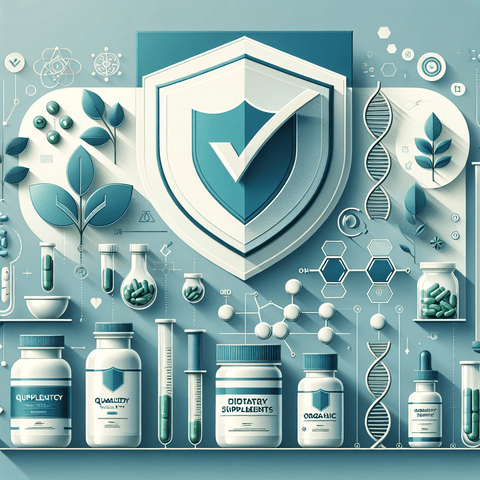Introduction
Vitamin B12 plays a vital role in numerous crucial bodily functions, including red blood cell formation, neurological function, and DNA synthesis. A deficiency in vitamin B12 can develop slowly over time, leading to debilitating symptoms that affect everyday life. The good news is that, with the right strategies and quick intervention, recovery from a vitamin B12 deficiency can be significantly accelerated. This article explores everything you need to know to regain your B12 levels fast, from understanding the causes and symptoms to selecting the most effective supplement strategies, dosage regimens, and complementary treatments. If you're feeling persistently tired, cognitively foggy, or noticing neurological disturbances, identified fast responses and ongoing management can make a critical difference for your long-term health. Let’s explore how to overcome a B12 deficiency the fastest and most efficient way.
Understanding Vitamin B12 Deficiency and Its Impact on Your Body
Vitamin B12, also known as cobalamin, is an essential water-soluble vitamin necessary for numerous vital processes including red blood cell production, DNA synthesis, and maintaining healthy nerve function. Unlike many other vitamins, B12 is found naturally only in animal-derived foods such as meat, dairy, and eggs. For individuals with limited animal product consumption—such as vegetarians or vegans—or those with absorption issues, B12 deficiency is a significant and often underdiagnosed health risk.
Common causes of B12 deficiency include:
- Inadequate dietary intake (vegetarian or vegan diets)
- Pernicious anemia (an autoimmune condition affecting intrinsic factor production)
- Malabsorption syndromes (such as celiac or Crohn’s disease)
- Age-related decreases in stomach acid (reducing B12 release from food)
- Use of certain medications, especially metformin and proton pump inhibitors
Recognizing the symptoms of a deficiency early is key to fast and full recovery. Watch out for signs like:
- Fatigue and weakness
- Tingling or numbness in hands and feet
- Pale or jaundiced skin
- Glossitis and mouth ulcers
- Balance issues
- Memory loss or brain fog
- Depression or mood changes
Left untreated, long-term B12 deficiency can cause irreversible nerve damage, so the urgency for an effective and fast recovery strategy is paramount for sustaining health and preventing permanent damage.
Vitamin B12 Deficiency Recovery: How Nutritional Supplements Play a Critical Role
Although increasing intake through food is beneficial for long-term maintenance, dietary sources alone are often insufficient to correct an existing deficiency, especially if malabsorption is involved. This is where vitamin B12 supplements become essential.
There are three primary types of B12 supplements available:
- Oral tablets/capsules: Best for individuals with mild deficiencies or dietary inadequacies.
- Sublingual forms: These dissolve under the tongue and may offer better absorption bypassing the digestive tract.
- Injectable B12 (intramuscular or subcutaneous): A rapid and highly effective method for those with malabsorption, severe deficiency, or neurological symptoms.
Supplements offer an efficient way to deliver higher doses of vitamin B12 directly into your system, especially when rapid correction is needed. Oral and sublingual supplements typically range from 500 mcg to 5000 mcg and are available in different forms like methylcobalamin (active) or cyanocobalamin (synthetic).
For patients requiring quick replenishment due to symptoms like fatigue, depression, or neurological dysfunction, supplementation under professional supervision can deliver fast results, often within days to weeks. Combining supplements with dietary support can further enhance effectiveness. Browse options in our collection of energy-supporting supplements like magnesium to enhance overall energy restoration.
Rapid B12 Deficiency Correction: Choosing the Right Supplement Form and Dosage
The speed of recovery is often determined by the route and form of vitamin B12 supplementation. While all forms aim to restore adequate levels, their absorption rate and bioavailability vary.
Oral vs. Injectable B12:
Oral B12 supplements are suitable for mild to moderate deficiencies and for maintenance therapy once levels stabilize. However, absorption from oral B12 depends on the presence of intrinsic factor in the stomach, which can be impaired in conditions like pernicious anemia. Injectable B12 bypasses absorption issues and delivers the vitamin directly into the bloodstream, making it the preferred option for more severe deficiencies.
Sublingual B12: This form dissolves under the tongue allowing absorption through the mucosa, which can offer a faster route than swallowing pills, especially for those with gastrointestinal issues.
Dosage Guidelines:
- Oral/Sublingual: 1000–5000 mcg daily depending on deficiency severity.
- Injectable: 1000 mcg intramuscularly daily for 7–10 days, then weekly, then monthly as needed.
When initiating therapy, follow-up tests are essential to evaluate the recovery of serum B12 levels, methylmalonic acid, and homocysteine—markers that directly indicate B12 functional activity in the body.
To enhance absorption and recovery, it’s beneficial to consider co-supplementation with related nutrients. Review compatible products in our vitamin D collection to support broader metabolic and immune function during B12 therapy.
B12 Deficiency Treatment Tips: Incorporating Supplements Into Your Daily Routine
Establishing consistent habits around supplementation increases the likelihood of recovery and avoids further complications. Here are some best practices:
1. Set a Reminder: Whether using pill organizers, smartphone alerts, or pairing with a daily habit like brushing your teeth, consistent timing ensures stable daily intake.
2. Pair with Food: Many people tolerate B12 supplements better when taken with meals. However, sublingual forms are best taken on an empty stomach for optimal absorption.
3. Combine with Food Modifications: Increase consumption of B12-rich foods (e.g., beef liver, sardines, tuna, eggs, and dairy). For plant-based individuals, B12-fortified foods should be emphasized alongside supplementation.
4. Address Absorption Problems: If oral supplements are not restoring B12 levels or symptoms persist, conditions like pernicious anemia or gastrointestinal disorders may limit absorption. In these cases, injectable B12 becomes the standard approach.
5. Monitor Your Symptoms: Look for improvements in mood, energy, and neurological function over time. If progress is slow, consult a healthcare provider.
Improving B12 levels is not only about supplementation—it’s also about ensuring that your body can consistently utilize what it receives. Coordinate your supplement plan with professionals when dealing with underlying conditions, and explore related products such as vitamin C formulas to support antioxidant uptake and recovery.
B12 Deficiency Symptom Relief: Using Supplements to Alleviate Discomfort Fast
Fast recovery from B12 deficiency isn't simply about correcting blood levels — it’s about relieving the debilitating symptoms that impair daily living. Supplementation can enable rapid improvement in both neurological and hematological symptoms, often within days to weeks, depending on the severity and individual response.
Fatigue and Weakness: As B12 is essential for red blood cell production and oxygen transport, low levels result in tiredness and physical exhaustion. Once B12 is restored, many patients experience renewed energy rapidly, especially when combined with magnesium and iron where appropriate.
Cognitive and Mood Issues: B12 affects brain function and neurotransmitter regulation. Deficiency can lead to cognitive fog, memory loss, and mood disturbances. Supplementation often significantly improves mental clarity and emotional stability.
Neurological Symptoms: Tingling, numbness, and coordination difficulties stem from impaired myelin production. B12 therapy helps restore proper nerve fiber insulation, particularly when high-dose injectable forms are used.
Hematological Problems: B12 is crucial for producing healthy, fully formed red blood cells. Supplementation can resolve megaloblastic anemia, improving oxygenation and vitality.
Support your supplement regimen with complementary lifestyle improvements such as sleep hygiene, hydration, light physical activity, and healthy omega-3 intake from our Omega-3 DHA & EPA collection. These changes play a cumulative role in enhancing the fast resolution of symptoms.
Accelerative B12 Therapy: Accelerating Recovery with Additional Nutritional Support
To further enhance B12 recovery, synergy with other nutrients is vital. Nutrients that work in tandem with B12 amplify its therapeutic benefits and address other linked deficiencies concurrently.
Folate (Vitamin B9): Functions closely with B12 in red blood cell and DNA synthesis. A deficiency in one can mask or worsen the effects of the other. Always ensure adequate folate intake when addressing B12 deficiency.
Vitamin B6: Involved in homocysteine metabolism along with B12 and folate. Supplementation helps support cardiovascular health alongside correcting B12-related issues.
Methylcobalamin vs. Cyanocobalamin: Methylcobalamin is a bioactive form of B12 readily utilized by the body. While cyanocobalamin is more stable and common, methylcobalamin is particularly beneficial for individuals with methylation problems due to MTHFR gene variants. Products featuring active forms are advised when fast neurological repair is the objective.
Magnesium: Vital for energy metabolism and neuromuscular function, magnesium deficiency often coexists with B12 deficiency. Consider products from our magnesium collection to accelerate your recovery.
Choose a comprehensive supplement regimen that addresses the multisystem impact of B12 deficiency. Multivitamin formulas or targeted B-complex supplements can offer strategic coverage, ideally from a source with transparent quality standards and optimal dosages.
Quick Recovery from Vitamin B12 Deficiency: Tips to Speed Up the Entire Process
If you’re wondering how quickly you can recover from a vitamin B12 deficiency, the answer lies in an integrated approach that combines rapid corrective supplementation, dietary enhancement, symptom tracking, and lifestyle optimization.
Recovery Timeline: Many people notice energy and cognitive improvements within days of beginning B12 treatment, especially with injections or high-dose sublinguals. Full resolution—or significant reduction—of symptoms often follows over weeks to several months depending on deficiency severity and adherence.
Key Acceleration Strategies:
- Use high-quality B12 supplements – preferably active forms with proven absorption rates.
- Increase intake of nutrient-cofactors like folate and magnesium.
- Review medications that interfere with B12 absorption.
- Stay hydrated and adopt a high-energy nutritional plan rich in complete proteins and healthy fats.
- Sleep and moderate exercise support metabolic rate and nutrient utilization.
Prevent Recurrence: Many people require ongoing maintenance doses of B12, especially if the root cause remains untreated or cannot be reversed. Monthly injections, weekly sublinguals, or daily oral tablets can all be part of a sustainable long-term strategy. Regular lab testing ensures vitamin levels remain within optimal range.
Listen to your body and work closely with a medical provider to customize a plan. Accelerating recovery is completely achievable with the correct tools and informed action.
Conclusion: Achieving Rapid B12 Deficiency Recovery Through Strategic Supplementation
Vitamin B12 deficiency can feel overwhelming, but with the right intervention, recovery is not only possible—it can also be swift. Knowing the signs, recognizing the urgency, selecting appropriate supplementation techniques, and supporting your body with synergistic nutrients all play a vital role in full restoration.
Key steps include:
- Identifying whether oral, sublingual, or injectable B12 best suits your needs
- Using scientifically validated dosages for effective restoration
- Pairing B12 with nutritional cofactors such as folate, magnesium, and vitamin B6
- Establishing a consistent daily routine to promote long-term recovery and maintenance
Recovery is a highly personal process, and professional guidance ensures you make informed choices. Consider exploring our range of evidence-supported supplement formulations on Topvitamine.com to find the right solution tailored to your needs.
Q&A Section
Q: What is vitamin B12 and why is it important?
A: Vitamin B12 is an essential nutrient involved in red blood cell production, nerve health, and DNA synthesis. Without enough B12, your body cannot function optimally.
Q: What is the fastest way to recover from a B12 deficiency?
A: The most rapid method is through high-dose injectable B12, followed by sublingual or oral forms combined with proper dietary and lifestyle support.
Q: How quickly do B12 supplements work?
A: Some people feel better within a few days; neurological symptoms may take several weeks to months to fully improve.
Q: Can I recover from B12 deficiency through diet alone?
A: While diet is essential for long-term maintenance, it is typically not sufficient for rapid correction. Supplements are usually required.
Q: How can I prevent B12 deficiency from recurring?
A: Consistent supplementation, routine testing, and addressing root causes (like dietary insufficiency or malabsorption) are key to prevention.
Important Keywords
Vitamin B12 deficiency, B12 supplements, methylcobalamin, injectable B12, sublingual B12, rapid B12 recovery, B12 deficiency symptoms, neurological health, anemia treatment, energy restoration, Topvitamine.com supplements, vitamin B12 treatment, B12 dosage guidelines, maintain B12 levels, quick vitamin B12 recovery, best B12 supplement forms.



